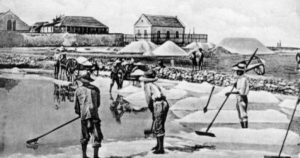
All through history of salt , the availability of salt has been pivotal to civilization. What is now thought to have been the first city in Europe is Solnitsata, in Bulgaria, which was a salt mine, providing the area now known as the Balkans with salt since 5400 BC. Even the name Solnitsata means “salt works”.
While people have used canning and artificial refrigeration to preserve food for the last hundred years or so, salt has been the best-known food preservative, especially for meat, for many thousands of years. Evidence indicates that Neolithic people of the Precucuteni Culture were boiling the salt-laden spring water through the process of briquetage to extract the salt as far back as 6050 BC.

salt in animal tissues:
There is more salt in animal tissues, such as meat, blood, and milk, than in plant tissues. With the spread of civilization, salt became one of the world’s main trading commodities. In the Middle East, salt was used to ceremonially seal an agreement, and the ancient Hebrews made a “covenant of salt” with God and sprinkled salt on their offerings to show their trust in him.An ancient practice in time of war was salting the earth: scattering salt around in a defeated city to prevent plant growth.
Salt in Africa:
In Africa, salt was used as currency south of the Sahara, and slabs of rock salt were used as coins in Abyssinia. Moorish merchants in the 6th century traded salt for gold, weight for weight. The Tuareg have traditionally maintained routes across the Sahara especially for the transportation of salt by Azalai (salt caravans). In Gabon, before the arrival of Europeans, the coast people carried on a remunerative trade with those of the interior by the medium of sea salt.
- Salzach literally means “salt river” and Salzburg “salt castle”, both taking their names from the German word Salz meaning salt and Hallstatt was the site of the world’s first salt mine.
- The town gave its name to the Hallstatt culture
- that name began mining for salt in the area in about 800 BC.
- Around 400 BC, the townsfolk, who had previously used pickaxes and shovels, began open pan salt making.
The word salad literally means “salted”, and comes from the ancient Roman practice of salting leaf vegetables.
- Venice fought and won a war with Genoa over the product
- Cities on overland trade routes grew rich by levying duties
- towns like Liverpool flourished on the export of salt extracted from the salt mines of Cheshire.
- Various governments have at different times imposed salt taxes on their peoples.
- the oppressive salt tax in France was one of the causes of the French Revolution.





